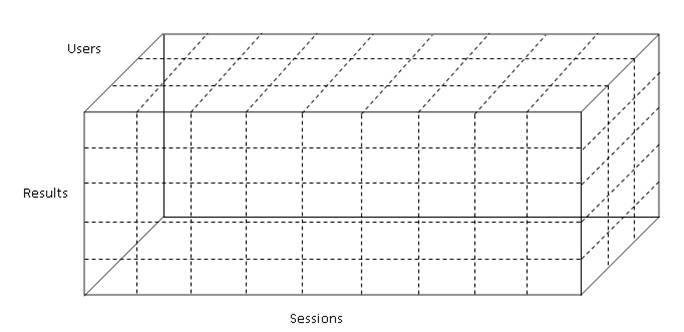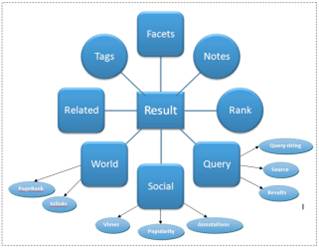
ResultsSpace is an
NSF-sponsored project (grant IIS 0812363)
started in the fall of 2008
that is part of the
Interaction Design Lab
at the
School of Information and Library Science
at the
University of North Carolina at Chapel Hill
.
Information seeking needs range from fact retreival to
life-long interests in complex topics. Today's search
engines leverage content, links, metadata, and context
to return information to the searcher based on queries
and selections. However, much work is left to the
information seeker to examine, interpret, and manage
results independent of the search system. The ResultsSpace
project focuses on a framework for results management
that will support searches over multiple sessions
and possibly in collaboration with other searchers.
The Results Space Model above presents a schematic view of the Result Space, which consists of three dimensions: results, sessions, and users. A given cell in this cube consists of a set of Result Frames (RFs) for a result object (e.g., a web page, PDF file, video file) for a single session by a single user. Note that for queries that do not yield saved results, if the users wants nonetheless to save the query for future reuse, we will index a "no saved result" (null) entry that includes the query and other generative and contextual information. This will allow the user a more continuous history option within a single data model. A RF consists of a specific result (e.g., a web page, PDF file, video file) with various attributes and subspaces associated with it. Each RF has attributes: rank, tags, and notes. Rank stores the rank of the result in the query that generated it. Tags are provided by the user and/or other collaborative users in the group and are similar to the tags used in social network and bookmark system. Notes offer users a way to annotate results with personally meaningful contextual information. Unlike tags, notes allow freeform text that can include descriptions of the relevance of the result to the person or project, information for collaborative group members, a plan for using the result, or other annotations. In addition to the attributes described above, each RF also contains the following subspaces: query, related, facets, world, and social. These subspaces can have attributes of their own. The query subspace contains attributes of the query that generated the result. These attributes are the query string, the source where the query was executed (e.g. Google, ACM Digital Library), and a listing of the top 100 results for the query (this number will be adjustable) from that source. The related subspace could contain items recommended by the source as being related to the result object such as explicit recommendations or outlinks.
Gonzalez-Ibanez, Roberto, and Shah, Chirag (2010). A proposal for measuring and implementing group's affective relevance in collaborative information seeking. Position paper at HCIR 2010 Workshop. New Brunswick, NJ. August 22, 2010. Shah, C. (in press). Designs for Systems to Support Collaborative Information Behavior. Book chapter to be published in Foster, Jonathan (Ed.) Collaborative Information Behavior. IGI Golbal, Hershey PA. Capra, R., Marchionini, G., Velasco-Martin, J., and Muller, K. 2010. Tools-at-hand and learning in multi-session, collaborative search. In Proceedings of the 28th International Conference on Human Factors in Computing Systems. Atlanta, Georgia, USA, April 10 - 15, 2010. CHI '10. ACM, New York, NY, 951-960. Shah, C. 2010. Working in Collaboration - What, Why, and How? In Proceedings of the 2nd International Workshop on Collaborative Information Seeking, held at CSCW 2010. Savannah, GA: February 7, 2010. Capra, R., Muller, K., and Velasco-Martin, J. 2010. Classifications of Collaborative Search. In Proceedings of the 2nd International Workshop on Collaborative Information Seeking, held at CSCW 2010. Savannah, GA: February 7, 2010. Shah, C. 2010. Coagmento- A Collaborative Information Seeking, Synthesis and Sense-Making Framework. Integrated demo at CSCW 2010. February 6-11, 2010. Savannah, Georgia. Shah, C. 2009. Lessons and Challenges for Collaborative Information Seeking (CIS) Systems Developers. Collaborative Information Behavior Workshop at GROUP 2009. May 10, 2009. Sanibel Island, Florida. Shah, C., Marchionini, G., and Kelly, D. 2009. Learning design principles for a collaborative information seeking system. In Proceedings of the 27th international Conference Extended Abstracts on Human Factors in Computing Systems. Boston, MA, USA, April 04 - 09, 2009. CHI EA '09. ACM, New York, NY, 3419-3424. Shah, Chirag and Marchionini, Gary. 2009. Query reuse in exploratory search tasks. In Workshop on Human-Computer Interaction and Information Retreival (HCIR 2009). October 23, 2009. Washington, DC. [ pdf ] Couchell-Koutsogiorgas, D. 2009. Design and Implementation of the Results Space Project into Android OS. Master's Paper. School of Information and Library Science, University of North Carolina at Chapel Hill. [ pdf ] Shah, Chirag. 2008. Understanding System Implementation and User Behavior in a Collaborative Information Seeking Environment. In Bulletin of IEEE Technical Committee on Digital Libraries, 4(2), Fall 2008. [ pdf ] Marchionini, G., Capra, R., Shah, C. 2008. Focus on Results: Personal and Group Information Seeking Over Time. Workshop on Human-Computer Interaction and Information Retreival (HCIR 2008). [ pdf ]
Introducing Coagmento See what Coagmento is, and how it can provide you a seamless solution for your online information seeking projects - right inside your browser. Installing Coagmento Learn how easy it is to download, install, and start using Coagmento plugin for Firefox. Using Coagmento for personal projects See how Coagmento could help you work through a project that spans multiple sessions, and involves exploring, collecting, and compiling online information. Using Coagmento for collaborative projects See how Coagmento could help you work through a project that involves multiple people working through several sessions. The collaborators could be working from anywhere and at the same or different time. Current
Alumni


|

